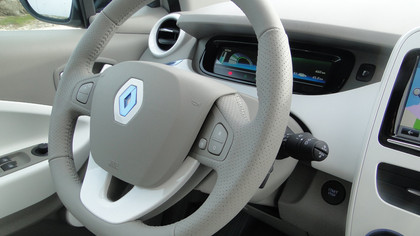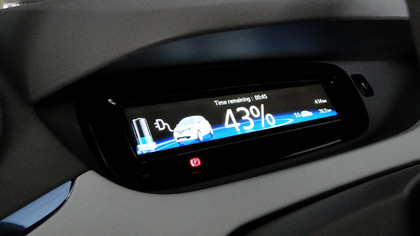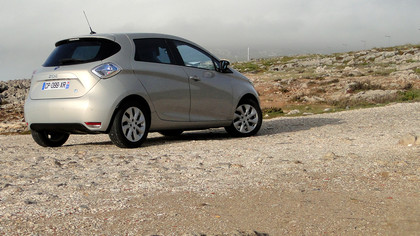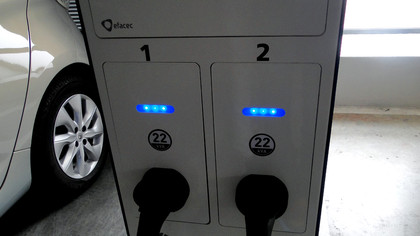Is Renault's revolutionary Zoe the first truly mainstream electric car?
We go hands on with the new electronic wonder
Driving the Renault Zoe
But what's the Zoe actually like to drive? That depends on where you're coming from. If you've never driven an EV, the immediate impression as you climb aboard is what's all the fuss about?
The steering wheel, the two pedals, you could be in any hatchback with an automatic gearbox. But as soon as you start moving, you'll be immediately blown away by the sheer refinement. At low speeds, it's almost unnerving how little noise it makes.

Suddenly, any conventional combustion hatchback seems absolutely antediluvian. What's more, with no gears to change, that serenity is never broken. It's a very seamless experience.
At higher speeds (the Zoe is limited to 84mph, its 88hp electric motor would probably allow it to crack 100mph, unlimited), you'll notice both wind and road roar seem heightened. But that's mainly because there's no engine noise to drown them out.
Not exactly a hot hatch
Overall performance, meanwhile, is fairly described as adequate. It feels similar to, say, a 1.2l hatchback in this class, just with a sharper immediate step off thanks to the electric motor's instant torque.
For EV aficionados, there's nothing hugely surprising about the Zoe. Nissan's Leaf is a little quicker, but also feels less agile than the Zoe.
All of which brings us to the ever-critical question of operating range. On the official NEDC cycle, the Zoe is rated at 130 miles. For context, the Nissan Leaf is rated at 109 miles, though an upgrade to 124 miles is coming soon.
Get daily insight, inspiration and deals in your inbox
Sign up for breaking news, reviews, opinion, top tech deals, and more.

Anyway, on paper the Zoe's range looks good. In practice, it's impressive, too. We intentionally drove without particular effort to nurse the battery and still got over 100 miles of real-world range.
For some, even 100 miles isn't nearly enough. But roughly 30% of cars in this class never complete a single journey of over 100 miles, from manufacture to final scrapping. As a daily town car, the Zoe's range is a non issue.
Renault Zoe: Running costs
What's more problematical is the running cost proposition. When you buy a Zoe, you're not buying the battery. You merely lease it. Prices start at £70 a month.
That's a problem. Here's why. Electric cars are not good long distance cars. They're good for lots of short journeys, day after day.

Very roughly, £70 is a tank of fuel. Most superminis will do 300 miles or more (possible much more if it's a diesel) on a tank. If, let's say, you do 10 miles a day, five days a week, that's a little over 200 miles a month. So, that tank could well last more than a month.
What's more, you still have to pay for electricity to charge the thing. OK, that will probably only add another £5 at worst per full charge, and usually a lot less (UK electricity is typically priced around 10p to 30p per kWh).
Road tax Freebie
And yes, you get free road tax and, for Londoners, you're Congestion Charge exempt, which for some could mean a big savings. But the bottom line for most is that you probably need to do more miles in a Zoe than really suits the usage model for an EV in terms of range to make the sums add up favourably.

That's a shame, because there's lots to like about the Zoe. It's a genuine, usable EV and the first we feel we can recommend. It just needs to be a bit more attractive financially.
As for that broader question of electric cars being the future of motoring, well, the jury remains out. EVs are certainly not a total transport solution. Other technologies are still required for longer journeys. But as a town-car proposition, the Zoe very nearly cracks it.
Technology and cars. Increasingly the twain shall meet. Which is handy, because Jeremy (Twitter) is addicted to both. Long-time tech journalist, former editor of iCar magazine and incumbent car guru for T3 magazine, Jeremy reckons in-car technology is about to go thermonuclear. No, not exploding cars. That would be silly. And dangerous. But rather an explosive period of unprecedented innovation. Enjoy the ride.